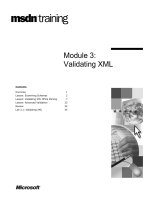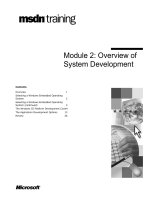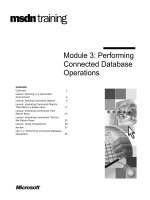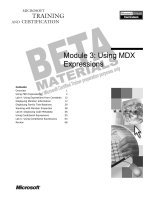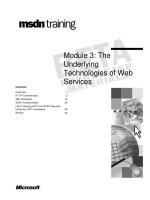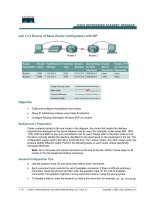Module 3 - Review of OSPF Operation potx
Bạn đang xem bản rút gọn của tài liệu. Xem và tải ngay bản đầy đủ của tài liệu tại đây (756.38 KB, 24 trang )
© 2008 Cisco Systems, Inc. All rights reserved. Cisco ConfidentialBSCI
1
BSCI Module 3 Lesson 2 - Review of OSPF Operation
OSPF
© 2008 Cisco Systems, Inc. All rights reserved.BSCI
2
CCNP – BSCI Bachkhoa Networking Academy
Học viện mạng Bách Khoa - www.bkacad.com
Objective
OSPF Packet Types
OSPF Packet Header Format
Establishing OSPF Neighbor Adjacencies
Exchanging and Synchronizing LSDBs
Discovering the Network Routes
Maintaining Network Routes
Maintaining Link-State Sequence Numbers
Verifying Packet Flow
© 2008 Cisco Systems, Inc. All rights reserved.BSCI
3
CCNP – BSCI Bachkhoa Networking Academy
Học viện mạng Bách Khoa - www.bkacad.com
OSPF Packet Formats
All OSPF packets begin with a 24-octet header
© 2008 Cisco Systems, Inc. All rights reserved.BSCI
4
CCNP – BSCI Bachkhoa Networking Academy
Học viện mạng Bách Khoa - www.bkacad.com
OSPF Packet Types
Version is the OSPF version number.
Type specifies the packet type following the header.
Packet length is the length of the OSPF packet, in octets, including the
header.
Router ID is the ID of the originating router.
Area ID is the area from which the packet originated.
AuType is the authentication mode being used.
Authentication is the information necessary for the packet to be
authenticated by whatever mode is specified in the AuType field.
© 2008 Cisco Systems, Inc. All rights reserved.BSCI
5
CCNP – BSCI Bachkhoa Networking Academy
Học viện mạng Bách Khoa - www.bkacad.com
OSPF Packet Types
© 2008 Cisco Systems, Inc. All rights reserved.BSCI
6
CCNP – BSCI Bachkhoa Networking Academy
Học viện mạng Bách Khoa - www.bkacad.com
OSPF Packet Header Format
2 or 3 5 type _____ ______ _____ _____
3 type
•No au
•Cle tx
•MD5
pass
© 2008 Cisco Systems, Inc. All rights reserved.BSCI
7
CCNP – BSCI Bachkhoa Networking Academy
Học viện mạng Bách Khoa - www.bkacad.com
The Hello Packet
The Hello packet establishes and maintains adjacencies. The Hello carries
parameters on which neighbors must agree in order to form an adjacency.
© 2008 Cisco Systems, Inc. All rights reserved.BSCI
8
CCNP – BSCI Bachkhoa Networking Academy
Học viện mạng Bách Khoa - www.bkacad.com
The Database Description Packet
The Database Description packet is used when an adjacency is being
established (see "Building an Adjacency," earlier in this chapter). The
primary purpose of the DD packet is to describe some or all of the LSAs in
the originator's database so that the receiver can determine whether it has
a matching LSA in its own database. This is done by listing only the
headers of the LSAs.
© 2008 Cisco Systems, Inc. All rights reserved.BSCI
9
CCNP – BSCI Bachkhoa Networking Academy
Học viện mạng Bách Khoa - www.bkacad.com
The Link State Request Packet
As Database Description packets are received during the database
synchronization process, a router will take note of any listed LSAs that are
not in its database or are more recent than its own LSA. These LSAs are
recorded in the Link State Request list. The router will then send one or
more Link State Request packets asking the neighbor for its copy of the
LSA.
© 2008 Cisco Systems, Inc. All rights reserved.BSCI
10
CCNP – BSCI Bachkhoa Networking Academy
Học viện mạng Bách Khoa - www.bkacad.com
The Link State Update Packet
The Link State Update packet, is used in the flooding of LSAs and to send
LSAs in response to Link State Requests.
© 2008 Cisco Systems, Inc. All rights reserved.BSCI
11
CCNP – BSCI Bachkhoa Networking Academy
Học viện mạng Bách Khoa - www.bkacad.com
The Link State Acknowledgment Packet
Link State Acknowledgment packets are used to make the flooding of
LSAs reliable. Each LSA received by a router from a neighbor must be
explicitly acknowledged in a Link State Acknowledgment packet.
© 2008 Cisco Systems, Inc. All rights reserved.BSCI
12
CCNP – BSCI Bachkhoa Networking Academy
Học viện mạng Bách Khoa - www.bkacad.com
Establishing OSPF Neighbor Adjacencies
Highest IP loopback then physical
10S&40s or 30s&120s
RID of neighbor
Area 0 or Area # 0
0-255 [1]
IP of DR in Multiple Access environment
None or Password or Hash
Stub, nssa … (Later)
© 2008 Cisco Systems, Inc. All rights reserved.BSCI
13
CCNP – BSCI Bachkhoa Networking Academy
Học viện mạng Bách Khoa - www.bkacad.com
Elect DR/BDR
© 2008 Cisco Systems, Inc. All rights reserved.BSCI
14
CCNP – BSCI Bachkhoa Networking Academy
Học viện mạng Bách Khoa - www.bkacad.com
Link-State Database Synchronization
© 2008 Cisco Systems, Inc. All rights reserved.BSCI
15
CCNP – BSCI Bachkhoa Networking Academy
Học viện mạng Bách Khoa - www.bkacad.com
Exchanging and Synchronizing LSDBs
On nonbroadcast multiaccess
(NBMA), point-to-multipoint,
and virtual links, the hello
packets are sent in unicast
packets.
Note
After a DR and BDR are selected,
any router added to the network
establishes adjacencies with the
DR and BDR only.
© 2008 Cisco Systems, Inc. All rights reserved.BSCI
16
CCNP – BSCI Bachkhoa Networking Academy
Học viện mạng Bách Khoa - www.bkacad.com
Discovering the Network Routes
© 2008 Cisco Systems, Inc. All rights reserved.BSCI
17
CCNP – BSCI Bachkhoa Networking Academy
Học viện mạng Bách Khoa - www.bkacad.com
Maintaining Network Routers
© 2008 Cisco Systems, Inc. All rights reserved.BSCI
18
CCNP – BSCI Bachkhoa Networking Academy
Học viện mạng Bách Khoa - www.bkacad.com
Maintaining Link-State Sequence Numbers
© 2008 Cisco Systems, Inc. All rights reserved.BSCI
19
CCNP – BSCI Bachkhoa Networking Academy
Học viện mạng Bách Khoa - www.bkacad.com
Verifying Packet Flow
© 2008 Cisco Systems, Inc. All rights reserved.BSCI
20
CCNP – BSCI Bachkhoa Networking Academy
Học viện mạng Bách Khoa - www.bkacad.com
Activity
3.2.1 Drag and Drop: OSPF Packet Types
–Upon completion of this activity, the student will be able to
identify the different OSPF packet types.
3.2.2 Drag and Drop: OSPF Packet Header
–Upon completion of this activity, the student will be able to
identify the different fields in an OSPF packet header.
3.2.5 Drag and Drop: OSPF States
–Upon completion of this activity, the student will be able to list
in order the different states of OSPF.
3.2.5 Drag and Drop: OSPF Neighbor States
–Upon completion of this activity, the student will be able to
identify the different OSPF neighbor states.
3.2.6 Drag and Drop: OSPF Operation
–Upon completion of this activity, the student will be able to list
the steps of OSPF operation.
© 2008 Cisco Systems, Inc. All rights reserved.BSCI
21
CCNP – BSCI Bachkhoa Networking Academy
Học viện mạng Bách Khoa - www.bkacad.com
Self Check
1. List 5 types of OSPF packets
2. Which router will be Master
3. Meaning of Sequence Number for LSA
© 2008 Cisco Systems, Inc. All rights reserved.BSCI
22
CCNP – BSCI Bachkhoa Networking Academy
Học viện mạng Bách Khoa - www.bkacad.com
Summary
OSPF Packet Types
OSPF Packet Header Format
Establishing OSPF Neighbor Adjacencies
Exchanging and Synchronizing LSDBs
Discovering the Network Routes
Maintaining Network Routes
Maintaining Link-State Sequence Numbers
Verifying Packet Flow
© 2008 Cisco Systems, Inc. All rights reserved.BSCI
23
CCNP – BSCI Bachkhoa Networking Academy
Học viện mạng Bách Khoa - www.bkacad.com
Q and A
© 2008 Cisco Systems, Inc. All rights reserved.BSCI
24
CCNP – BSCI Bachkhoa Networking Academy
Học viện mạng Bách Khoa - www.bkacad.com
